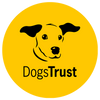Caring for your senior dog
There is a reason why old age is often referred to as the Golden Years and

spending time with your senior dog at this stage of his life can be very precious. He may not have such a spring in his step or want to leave his cosy spot whilst he dozes away in the sun but with regular veterinary attention, daily care and proper nutrition, your senior dog can still have a very happy, healthy life.
The most important thing to remember is to pay attention to your friend, try to understand his needs and, above all, spend as much time as possible with him.
Rates of ageing in dogs
Dogs are often older than we think they are, especially when we've had them as puppies, as time flies by! Different breeds of dogs age at different rates - small dogs live the longest, while large and giant breeds have relatively short lifespans (a Great Dane is considered 'old' at five). Your dog's general condition and medical history will affect his life span and ageing processes too.

Helping your senior dog to be comfortable
Your senior dog will like routine as he will be less able to cope with change. Knowing what to expect and when to expect it will keep him contented and stress-free. Old dogs are also less able to deal with extremes of temperature so make sure he can find a cool shaded place away from the heat in summer and isn't exposed to the cold in winter. His bed or basket should be in a snug place away from draughts and made comfortable with plenty of padding to insulate him from the cold floor and protect his achy joints.
Your senior dog's eyesight
How do I know my senior dog's eyesight is failing?
You might notice that your dog's eyes (pupils) have a cloudy bluish haze to them. This can be quite normal and is called Lenticular (or Nuclear) Sclerosis and is just a sign of your dog getting older. However it could be Cataracts forming. Cataracts tend to be white and opaque so it is best to check with your vet if you notice that your dog's vision is impaired. They can be removed by surgery and your vet will advise you what the best course to take is. Another sign of age is discharge collecting in the corner of his eyes which can be uncomfortable if it is allowed to dry but this can be wiped away with a sterilised cloth or wipe.
Tips on dealing with senior dog's with poor eyesight
If your dog's sight does become very bad – or even if he goes blind – you will be surprised how well he manages. He will know his way around the house and garden by habit and by scent so be careful not to change the furniture around or redesign the garden. If you have to make any changes guide him around them until he becomes used to the new layout. Always stay close to him when walking and don't let him wander off.
Your senior dog's hearing
How do I know my senior dog's hearing is failing?
Some senior dogs become deaf or have impaired hearing in their old age. You may notice that he is hard to wake up and doesn't notice if you walk behind him. Deaf dogs will sleep very soundly so be careful when you waken him. If you touch him he may be startled awake so the best way is to stamp your foot on the floor so that he can feel the vibrations. Unfortunately there isn't a lot that can be done for age-related hearing loss, but if you are worried take him to your vet to rule out other medical problems, such as an infection, growth, or foreign body in the ear.
Tips on dealing with senior dog's with poor hearing
If your dog can not hear your commands he will soon pick up what you mean from hand signals – he may be old but he can still learn new tricks! Patting your hands on your knees to show him to come to you works very well. Take a torch out with you into the garden when he is relieving himself at night and flash it to show him it's time to come in. Take care to protect him from cars and pedestrians as he will not hear them coming. Some dogs, while not technically deaf, may lose the ability to hear noises of a certain pitch so if he doesn't respond to your voice this may be the problem. Try either clapping your hands to attract his attention or use a whistle.

Incontinence
Incontinence is quite common, especially in the older bitch. Sometimes it's caused by an infection or weak bladder muscles. Please don't tell her off is this happens as she can't help it and will be upset at making a mess herself. There are medications available so it is best to seek veterinary advice.
Arthritis
Older dogs can suffer from Arthritis just like us and large dogs tend to suffer from it more than others. You may notice that your dog is slow to get up or lie down and has difficulty using the stairs which can get worse in cold or rainy weather. It's a good idea to check with your vet to find out if it is definitely Arthritis. Whilst there is no cure there are food supplements you can feed your dog and medications your vet can prescribe to help with his aches and pains. You can place your dog's bed next to a radiator in Winter to give him comfort and help him in and out of the car either by lifting (if he is a small dog) or by purchasing a ramp.
Your senior dog's teeth and gums
Older dogs are more prone to gum disease and plaque build-up so it's best to check your dog's mouth, teeth and gums regularly. Signs that your dog has dental problems are dropping his food, dribbling, pawing at his mouth, bad breath and difficulty chewing. Dogs with decaying teeth can be in pain and lose weight so take him for a check up at your vet if you think he has dental issues. Infection can spread from the mouth to the internal organs and swellings below the eye may be signs of tooth root abscesses and need veterinary attention.
Grooming your senior dog
Most dogs start to show a bit of grey around their face and muzzle when they are 5 – 6 years old. It's important to groom your dog regularly but as he ages his skin will be thinner and he may have a few warts, so take care when brushing his coat. You may notice that you need to clip his claws more often as they are not wearing down as much due to his slower pace of life.
To learn more about grooming your senior dog visit our Grooming Advice.
Petstop have a great range of grooming accessories in our Products section.

Your senior dog and exercise
Your dog may not want to chase after balls as much as he used to but he will still need regular exercise to keep him fit and prevent obesity. You can take slower, shorter walks and play games such as hide and seek with toys to exercise his mind to keep him interested in life.
Feeding your senior dog
What do I feed my senior dog?
Senior dogs need a diet that will keep them active and healthy throughout their later years and the usual Adult dog foods don't contain the nutrients they need. It's best to choose a dog food made especially for older dogs to keep him well and happy. Older dogs need fewer calories as they are not as energetic as they used to be. Senior dog foods are made to be easily digestible and contain minerals to support ageing joints as well as fatty acids to prevent dry skin. They also have smaller kibbles which are easier to chew, especially if your dog is losing his teeth.
View Feeding Advice to learn more.
Visit our products section for a wide variety of senior dog foods
Medical conditions in senior dogs
It's important to take your dog to vet regularly in his old age and some vets run special clinics for check ups for older dogs. Many signs of old age are very treatable and you can take preventative measures to keep your dog in good health. If you notice any of the signs below, or any other signs of illness such as vomiting, diarrhoea, seizures or fainting, loss of appetite, weight loss or weight gain or reluctance to exercise you should contact your vet.
- Heart and Respiratory conditions – signs to look out for are a reluctance to exercise, coughing, trouble breathing, and lethargy.
- Kidney problems - signs are an excessive thirst and frequent or uncontrolled urination. Drinking and urinating more than usual can also be a sign of Diabetes.
- Cancer - any unexplained weight loss, or growths, warts or skin lumps should be investigated.
- Confusion / Senility – this can be Cognitive behavioural dysfunction and the signs are disorientation, pacing, whining and barking at odd times.






